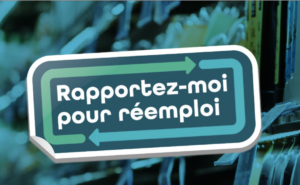Oubliez un instant la concurrence : vos rivaux sont vos alliés dans la transition. Le cabinet de conseil (RE)SET accompagne les entreprises qui veulent transformer leur chaîne de valeur à plusieurs pour limiter les risques et accélérer le processus. Une petite révolution.
« Trop risqué ». Combien de fois avez-vous entendu une entreprise justifier son inaction climatique par les risques financiers qu’elle encourt à se transformer ? Nombreuses sont celles qui se contentent de la politique des petits pas, dépassées par la perspective de la remise en question de leur chaîne de valeur.
Il existe pourtant un moyen de limiter les risques de la transition : la coopération. De la même façon que l’action climatique ne peut pas se contenter d’être la nième case de nos to-do lists personnelles (produits bios + pipi sous la douche + vélo ≠ planète sauvée), il ne sert pas à grand-chose qu’une entreprise fasse sa transition si les autres ne suivent pas. Pire : dans un environnement instable et hyperconcurrentiel, agir seul est presque toujours voué à l’échec.
La coopération transsectorielle n’est pas une mince affaire pour les entreprises, mais consortiums et collectifs se multiplient pour accompagner la révolution. Et si aucun secteur industriel n’échappe à ces questions, certains ont une longueur d’avance. Le secteur de la cosmétique est de ces pionniers. En juin 2021, la FEBEA, Fédération des entreprises de la beauté, a lancé son Plastic Act, avec pour objectif d’aller plus vite que ce que la loi AGEC (Anti-Gaspillage et Économie Circulaire) exige : réemployer 20 % des emballages, développer le vrac, réduire de 15 % le volume d’emballages plastiques par l’écoconception et la substitution par de nouveaux matériaux… Le tout, à horizon 2025. Le secteur cosmétique est ainsi devenu le premier secteur à se doter collectivement d’objectifs chiffrés.
À la manœuvre de ce travail d’ampleur qui a fait grand bruit, un jeune cabinet de conseil spécialisé dans la transition, The (RE)SET Company, créé en 2019 et mené par Géraldine Poivert. Depuis 2019, (RE)SET se donne pour mission de faire bouger les lignes dans dix secteurs stratégiques (emballages, cosmétiques, mobilier, textile…), en travaillant à la fois avec des clients uniques et en consortiums. Le slogan de (RE)SET: « cooperation is the new competition ».
Un consortium pour limiter les risques
L’année dernière, quatorze entreprises du secteur (Chanel, L’Oréal, Sisley, L’Occitane…) ont recontacté (RE)SET pour se constituer en un consortium, Pulp In Action. L’objectif : s’accorder sur le développement de nouveaux matériaux en fibre de cellulose substituables au plastique, pour s’attaquer de front à l’épineuse question du packaging cosmétique.

Le consortium prend le problème du packaging à la source, c’est-à-dire dans les laboratoires, pour développer des matières innovantes aux propriétés adaptées aux produits cosmétiques. (RE)SET écoute les besoins formulés par les entreprises, organise les concertations, source les matériaux en fibre, et s’assure qu’ils soient fonctionnels pour les entreprises. Après une première année de concertation et de sourcing, une quinzaine de pilotes de packagings sont déjà à l’étude.
Si l’urgence de la sortie du plastique ne fait plus débat, la mise en œuvre de cette noble intention est un casse-tête pour une entreprise cosmétique. « Le plastique est une matière géniale, avec des propriétés difficiles à retrouver ailleurs », reconnaît Géraldine Poivert. L’industrie tout entière est construite sur l’hégémonie du plastique : « même les protocoles de test des emballages sur lesquels nous sommes censés nous appuyer ont été façonnés pour le plastique et ne sont pas adaptés aux nouvelles matières. Tout est à reprendre. Les changements industriels que nous devons mener sont de vraies révolutions. »
C’est face à cette montagne à gravir que s’unir devient pertinent. « On ne peut pas réfléchir au packaging seul dans son coin », insiste la fondatrice de (RE)SET : « il faut se poser au niveau du secteur pour décider de nouveaux standards. La cosmétique en a eu l’intuition très tôt. »
« On ne monte pas une armada pour une niche »
Les risques de la transition sont multiples. D’abord, innover coûte cher. Autant s’y mettre à plusieurs, surtout lorsque c’est le monopole du plastique établi sur le packaging depuis des décennies qu’il s’agit de challenger. « Ensuite, il y a toujours le risque que le consommateur ne suive pas », relève Géraldine Poivert. « Pour toute innovation, il faut un marché. Si une entreprise est la seule à proposer un nouveau produit et qu’il n’y a pas de mouvement massif pour accompagner le consommateur, il y a de grandes chances qu’elle soit perdante. » Enfin, les fournisseurs seront réticents si l’entreprise la joue loup solitaire : « au niveau industriel, on ne va pas changer une machine-outil pour 5 % du marché. On ne monte pas toute une armada pour une niche. »
Le consortium permet alors aux entreprises de « dérisquer l’innovation ». « Les concurrents ont un intérêt commun, qui est aussi l’intérêt général : celui de redéfinir des standards. » C’est ce qui s’est produit au moment de la révolution digitale, compare Géraldine Poivert : « au début d’Internet, il a fallu tomber d’accord sur un Internet protocolaire. On est à ce moment-là de la transition environnementale. »
Pour Géraldine Poivert, la coopération a du sens au début de la transition, « lorsqu’on en est au défrichage. » La logique est simple : « Avant de s’affronter sur le terrain de foot, il faut créer le terrain de foot. Cela n’empêchera pas les entreprises de se différencier par la suite, mais il faut passer par une phase de définition des standards. » Et donc s’asseoir à la même table que ses concurrents pendant quelques mois, voire quelques années.
« Un costume d’Arlequin »
La coopération est devenue un passage obligé pour chaque secteur, mais elle n’en est pas moins un numéro d’équilibriste. « Ce n’est jamais facile d’animer un consortium », reconnaît volontiers Géraldine Poivert. « Cela signifie créer une dynamique collective avec des gens qui ont leurs ego, leurs habitudes, leur culture d’entreprise. »
C’est d’autant plus complexe que les quatorze marques de Pulp In Action ont des profils très divers : marques internationales ou plutôt tournées vers la France, maisons de luxes ou clientèle grand public… Chanel, L’Occitane et Sisley n’ont pas les mêmes priorités.
« L’idée est de créer un costume d’Arlequin », explique Géraldine Poivert, « pour que tout le monde quitte le consortium avec le même costume sans pour autant avoir renoncé à son identité. » Un patchwork que (RE)SET semble avoir réussi, puisque les quatorze entreprises viennent de signer pour une deuxième année de travail.
« Le secteur de la cosmétique ose jouer collectif »
Pour Géraldine Poivert, le secteur de la cosmétique est particulièrement bien positionné sur le sujet. « La cosmétique est un secteur qui a les moyens, qui ose jouer collectif quand il le faut, et qui par sa culture de l’innovation, peut être moteur dans la transition environnementale. »
Géraldine rappelle sa fierté d’avoir été contactée par la FEBEA au moment du Plastic Act : « c’était la première organisation professionnelle sectorielle à avoir fait un plan d’action sur le plastique, et l’État s’en est ensuite inspiré pour ses feuilles de route sectorielles recommandées par l’ADEME. »
Périmée, la concurrence ?
2025, 2030, 2050… Les délais donnés aux entreprises pour opérer la transformation de leurs activités sont courts. Les directives nationales et européennes se multiplient, et il y a désormais plus de risques à ne rien faire qu’à se transformer. À l’heure de l’urgence, le fonctionnement en silo ne permet plus aux secteurs de se transformer suffisamment vite. Au-delà des cosmétiques, certains groupes l’ont bien compris. Nestlé Waters, PepsiCo et Suntory ont uni leurs forces à celles du fournisseur Carbios pour accélérer la mise au point du recyclage enzymatique du plastique. Les fournisseurs d’énergies et fabricants de camion se rassemblent quant à eux pour développer des camions à hydrogène. Depuis 2021, l’ADEME propose elle aussi des « feuilles de route sectorielles » pour mettre en œuvre la coopération au sein d’une industrie.
Dans cette révolution des relations entre les entreprises, (RE)SET offre la perspective rassurante d’un accompagnement à 360°. Le cabinet de conseil « intégré » met en œuvre la transformation de l’entreprise dans chacune de ses phases, de la R&D au déploiement industriel en passant par la réflexion stratégique. Impossible de faire l’économie d’un tel tour d’horizon si l’on veut aller plus loin qu’une transformation de surface, insiste Géraldine Poivert.
Mais si (RE)SET propose une démarche ambitieuse aux entreprises, elle prend soin de se distinguer de certains discours écologistes. « Chez (RE)SET, nous faisons de la transition pour de vrai. Nous croyons en la croissance verte et en l’écologie de solutions. » Pas question de parler de décroissance pour ce cabinet qui met un point d’honneur à s’adresser aux entreprises dans leur langue, celle du business. Un positionnement qui semble gagnant puisqu’il a permis à (RE)SET de gagner la confiance de dizaines d’entreprises, de Carrefour à Decathlon en passant par Hachette et Orange.
Certains groupes vont plus loin encore en mettant leurs innovations en open source, à disposition de tous : c’est le cas de L’Oréal qui a donné accès en 2020 à son outil d’analyse du cycle de vie des produits cosmétiques, SPICE, pour que toutes les entreprises puissent faire leur diagnostic gratuitement. C’est aussi sur l’open source que mise Time for the Planet, entreprise qui vise à rassembler 1 milliard d’euros pour financer 100 entreprises pour la transition. Pour cette entreprise au modèle un peu particulier, la concurrence est tout bonnement périmée : l’entreprise propose en accès libre les innovations qu’elle finance pour qu’elles soient réplicables le plus vite possible, au vu de l’urgence climatique. De plateau télé en post LinkedIn, les fondateurs de l’entreprise ne cessent de le répéter : « L’heure n’est plus à la concurrence mais à la coopération. »



